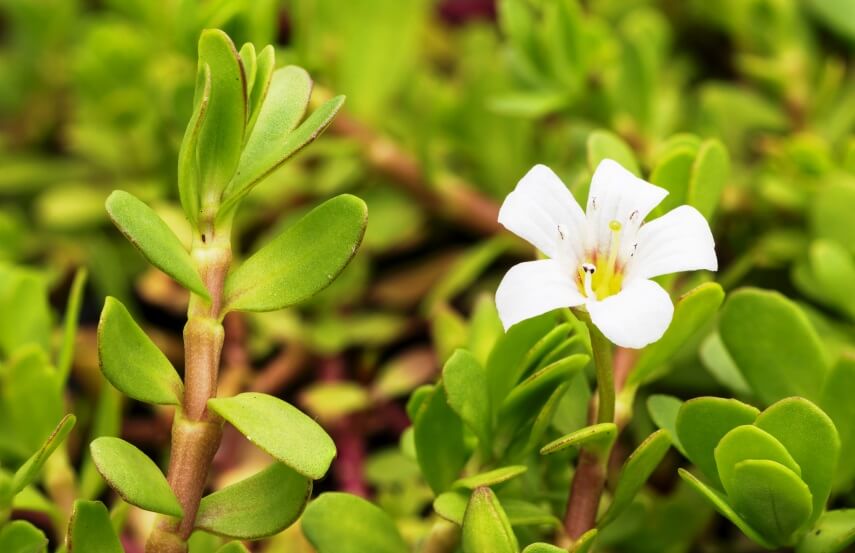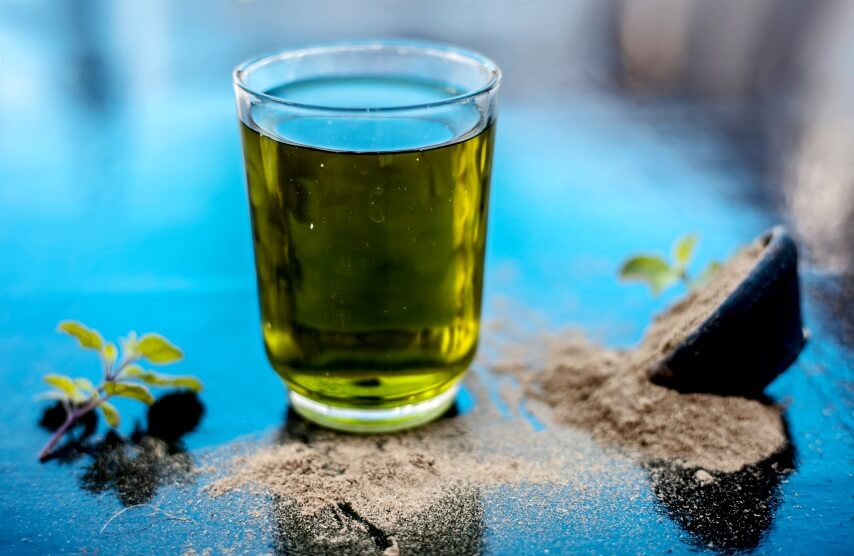Bacopa monnieri (BM), commonly known as Brahmi, water hyssop, thyme-leaved gratiola, and the herb of grace, is a creeping perennial plant belonging to the Scrophulariaceae family. Bacopa monnieri is used to enhance memory, treat insomnia and epilepsy, and reduce anxiety. Clinical investigations have demonstrated improvements in verbal learning, delayed word recall, memory acquisition, and reduction of anxiety. Due to the many advantages of Bacopa, this article will explore the potential health benefits of Bacopa Monnieri.
If you are interested in this topic, you can also read
<<Yucca Benefits>> and <<Black Sage Benefits>> articles.
About Bacopa Monnieri
Bacopa Monnieri is native to India, Indochina, Australia, and Sri Lanka and has been used in Ayurvedic medicine to treat various mental disorders. Within Ayurveda, Bacopa is classified as a “medhya rasayana,” a substance believed to enhance mental well-being, memory, and intellect and promote rejuvenation and longevity.
Human studies have indicated favorable effects of Bacopa on cognitive performance, verbal learning, delayed word recall, memory acquisition, and reduction of anxiety. However, it is important to note that the FDA has cautioned dietary supplement manufacturers against making therapeutic claims regarding products containing Bacopa monnieri. Bacopa can be used alone or in conjunction with other nootropic herbs, such as Gotu Kola (Centella Asiatica), which possess neuroprotective properties and provide therapeutic benefits for individuals experiencing memory loss [1].
Nutritional Value Of Bacopa Monnieri
Bacopa monnieri is a plant that contains various secondary metabolites with clinical significance, such as saponins, alcohols, steroids, alkaloids, glycosides, sterol glycosides, phenylethanoid glycosides, sugars, amino acids, flavonoids, and cucurbitacins. Notably, the plant extracts also contain specific amino acids, including glutamic acid, aspartic acid, alanine, serine, dimannitol, herpestin, hydrocotyline, nicotine, and herpestin.
The key components of Bacopa monnieri, known as bacosides, play a crucial role in maintaining healthy neurons. Bacoside-A, a chemical compound found in the plant, is amphiphilic and consists of both sugar and sterol moieties. The plant also contains 12 analogs of bacosides, known as bacopazid I-XII, which have been shown to protect neurons associated with Alzheimer’s disease (AD) by increasing kinase activity and neurosynthesis, as well as restoring damaged neurons.
The neuropharmacological and nootropic effects of Bacopa monnieri are primarily attributed to bacosides A and B. Another important component of the plant, bacogenin A1-A5, which are derivatives of acid-degraded bacosides, contains ebelin lactone. Additionally, there are saponins called bacopazid I-XII that interact with sterols and disrupt cell membranes. The specific properties of jujubogenin and pseudojujubogenin derivatives, known as Bacopasaponin A-H, are still not fully understood [2].
Bacopa Monnieri Benefits
Antioxidant Properties
Recent research has indicated that the consumption of BM leaf powder can enhance the antioxidant defense systems in various anatomical regions within the brain, including the cytosol and mitochondria. Additionally, it has been shown that BM leaf powder can decrease depression-like behavior in mice and increase the levels of antioxidant enzymes [3].
Neuroprotective Role
The process of neuroprotection refers to the restoration or restructuring of nerve structure and function. The Bacopa plant, which contains triterpenoid saponins and bacosides, has been found to enhance the transmission of nerve impulses. These bacosides play a role in the recovery of damaged neurons by promoting kinase activity, neuron synthesis, and the restoration of synaptic activity.
Research studies have demonstrated that Bacopa extract can enhance learning capacity in rats by improving the acquisition, consolidation, and retention of newly learned behavioral responses. Furthermore, the antioxidant effects of Bacopa, particularly its bacosides, have been shown to enhance various aspects of brain function and improve learning capacity [3].
Cancer Prevention
Bacopa monnieri has demonstrated anti-cancer properties due to the presence of terpenoid compounds, specifically bacopaside I and bacopaside II. Additionally, studies have demonstrated that the alcoholic extract of Bacopa monnieri exhibits antioxidant properties. Bacoside A, an extract derived from Bacopa monnieri, has been found to protect against liver damage.
Furthermore, it has been observed that it can suppress the activity and expression of matrix metalloproteinase enzymes (MMPs) responsible for metastasis in various tumors. Moreover, B. monnieri has shown promise as a therapeutic target for glioblastoma, an aggressive brain tumor with a poor prognosis.
The neuroprotective potential of B. monnieri has been investigated using active substances such as bacopa saponins, betulinic acid, and bacoside A and B. It has been found to mitigate oxidative damage caused by hydrogen peroxide in human neuroblastoma cell lines, suggesting its potential efficacy in the treatment of various types of cancer and its ability to enhance brain development [2].
Anti-Microbial Properties
Traditional medicine utilizes various plant species, such as Bacopa monnieri, for their potential anti-microbial properties. Gosh et al. researched the ethanolic extract of B. monnieri. They found that BM extract has an anti-microbial effect. This study suggests that B. monnieri aerial parts may be beneficial in treating a range of pathogenic illnesses that are referenced in Ayurvedic literature.
Neuroprotective Effects
The neuroprotective effects of bacopazid I have been substantiated through its ability to reduce edema, cerebral infarct volume, and neurological impairments in mice. Furthermore, treatment with bacopazid I exhibited improvements in motor coordination, short-term memory, and a reduction in infarct size in mouse models. In rats, bacopazid I was found to enhance brain ATP levels while concurrently reducing edema, infarct volume, and neurological disorders. This indicates an improvement in brain energy metabolism and antioxidant activity [3].
Good For Treating Parkinson’s Disease
Parkinson’s disease (PD) is a neurodegenerative disorder characterized by the degeneration of neurons and the accumulation of a protein called alpha-synuclein. Recent studies have shown that an extract from the plant Bacopa monnieri (B. monnieri) has the potential to modulate Parkinson’s disease in animal models. Specifically, the alcoholic extract of B. monnieri, known as bacosides, has demonstrated antiparkinsonian effects in a model organism called Caenorhabditis elegans.
In this model, bacosides were found to prevent the degeneration of dopaminergic neurons and promote the restoration of lipids in the nematodes. Furthermore, treatment with Bacopa extract in mice with parkinsonism protected the dopaminergic neurons in the substantia nigra, a region of the brain affected by PD. Additionally, the extract improved behavioral abnormalities, reduced oxidative stress, and decreased cell death in a fruit fly model of PD. These findings provide evidence of the potential efficacy of B. monnieri as a novel therapeutic approach for treating PD [2].
Good For Treating Alzheimer’s Disease
Alzheimer’s disease (AD) is characterized by the degeneration of cholinergic neurons in the hippocampus, and the use of acetylcholine as a potential treatment has been suggested. Bacopa monnieri (BM) is a promising herbal supplement with nootropic properties. It possesses antioxidant, cholinergic, and anti-beta-amyloid properties while also demonstrating an acceptable safety profile.
Studies have shown that BM extract can enhance memory and cognitive performance in both animal models and human volunteers. Additionally, its antioxidant activity holds promise as a therapeutic approach for dementia. BM has been found to regulate caspase-10 expression and reduce neuroinflammation, which further supports its potential in treating this condition. Furthermore, chronic use of BM may enhance cerebral blood flow, which could contribute to its beneficial effects on cognition and neuroprotection [3].
Good For Treating Schizophrenia
According to a published study, Bacopa monnieri enhances cognitive performance in a rat model of schizophrenia. The frontal cortex, striatum, and hippocampus of mice all had a higher density of a protein called VGLUT1 when Bacopa monnieri was administered. The release of the neurotransmitter glutamate, which is critical for cognitive function, is mediated by the VGLUT1 protein. More research is needed to determine whether Bacopa monnieri is useful in the treatment of schizophrenia in humans, although the study does show some promise [4].
Increasing memory
According to scientific research, the effectiveness of bacopa extract in treating diazepam-induced amnesia and improving learning capacity in rats has been demonstrated. However, a comprehensive analysis of the cognitive effects of BM extract reveals that the impact of the extract on memory remains uncertain due to significant variability in outcomes across various tests [2].
Anti-Inflammatory Properties
Multiple studies have provided evidence supporting the potent anti-inflammatory effects of bacopa monnieri. In laboratory settings, bacopa monnieri has demonstrated anti-inflammatory properties on cells of the innate immune system. Furthermore, experiments using a methanolic extract to induce edema in the hind paws of mice have consistently demonstrated the strong anti-inflammatory properties of bacopa monnieri. Bacopa monnieri inhibits inflammatory pathways in the brain, suggesting a possible link between the plant’s systemic anti-inflammatory properties and its psychoactive effects [5, 6].
Blood Pressure Regulation
That’s not all the benefits of Bacopa Brahmi (Waterhyssop). Studies have demonstrated that Bacopa monnieri exhibits vasodilatory properties on various types of arteries and effectively reduces blood pressure in anesthetized rats. The release of nitric oxide by Brahmi from the endothelium plays a significant role in these effects, as it also influences vascular smooth muscles, leading to a decrease in blood pressure. In the case of rat mesenteric arteries, the active components of bacopa monnieri exhibit vasodilatory effects. Furthermore, Bacopa monnieri has been observed to enhance cerebral blood flow in rats without affecting blood pressure levels [7, 8].
Benefits Of Bacopa Monnieri For Male
Bacopa monnieri has been proven to protect against the harmful effects of nicotine, including physical, psychological, neurobehavioral, and biochemical changes in the cerebellum. Furthermore, Bacopa monnieri improves the quality of sperm, density of spermatogenic cells, and steroidogenic indices in the testis [9, 10].
Benefits Of Bacopa Monnieri For Female
Research suggests that Bacopa monnieri can help alleviate the specific symptoms that women may experience during the mental challenges of menopause. A study conducted over 12 weeks with 60 older individuals showed that taking a daily dose of 300-600 mg of Bacopa monnieri improved memory, focus, and information retention. These are all common issues experienced by menopausal women who are dealing with cognitive difficulties. Furthermore, there is a lack of empirical evidence from clinical studies to support the traditional use of Bacopa monnieri in rebalancing hormones in women [11].
Bacopa Monnieri Side-Effects
Bacopa monnieri is generally well tolerated and has a favorable therapeutic index. However, some individuals may experience gastrointestinal side effects, such as nausea, abdominal cramping, and increased frequency of bowel movements. These adverse effects are believed to be caused by gastrointestinal irritation from saponins or increased acetylcholine activity.
Additionally, a study suggests that bacopa extract may reduce fertility in animals without affecting libido. Bacopa monnieri may inhibit the enzyme acetylcholinesterase, which can result in elevated levels of acetylcholine. This can potentially worsen conditions such as bradycardia, gastrointestinal obstruction, peptic ulcer disease, pulmonary disorders like asthma and chronic obstructive pulmonary disease, or obstruction in the genitourinary tract. It may also counteract the effects of anticholinergic drugs [1].
In rare cases, a few individuals may experience an allergic response to Bacopa monnieri, which can present as a skin rash, itching, swelling of the airways, and difficulty breathing. Furthermore, certain Ayurvedic remedies, such as Bacopa monnieri, have been found to contain toxic substances like lead, mercury, and arsenic. To prevent any adverse effects, it is crucial to obtain Bacopa monnieri from a reliable source and follow the manufacturer’s instructions when taking it [12].
How To Use Bacopa Monnieri
Bacopa Monnieri is an herb that has been traditionally used for its potential benefits in promoting brain and nervous system health. It can be incorporated into one’s diet through various means, either as a food or as a supplement. When considering its use as a food, Bacopa Monnieri can be consumed in various forms. Firstly, it can be eaten raw, although its taste is notably bitter. Alternatively, it can be steamed and consumed as a cooked vegetable.
In India, it is commonly dried and used to prepare tea. However, the acquired taste of the tea may not be appealing to everyone. As for its use as a supplement, Bacopa Monnieri is often consumed in the form of Bacopa powder. According to Ayurvedic practices, it is recommended to take the powder with a carrier substance known as anupan, such as water, milk, or ghee. This method of consumption allows individuals to experience the taste of the herb, which can potentially support the digestive and absorption processes within the body [13].














